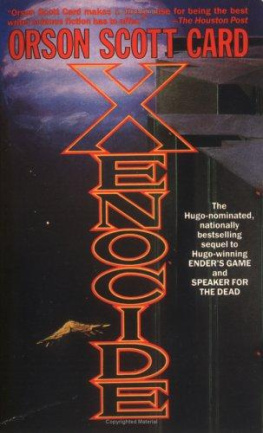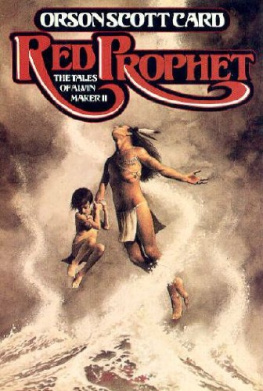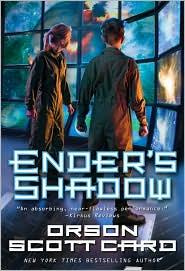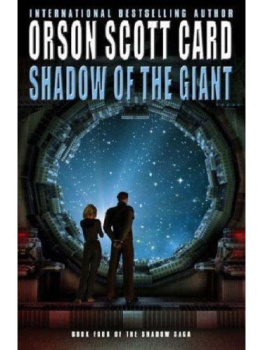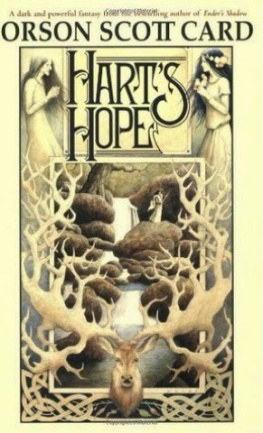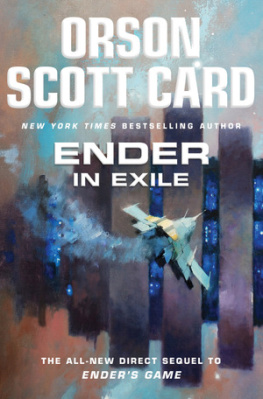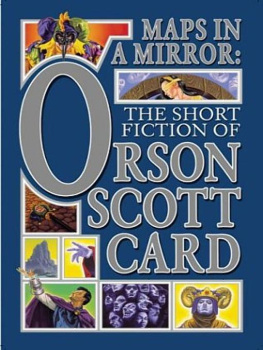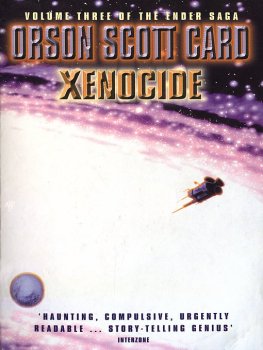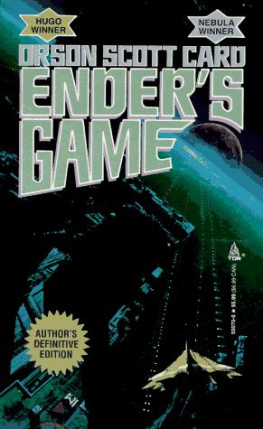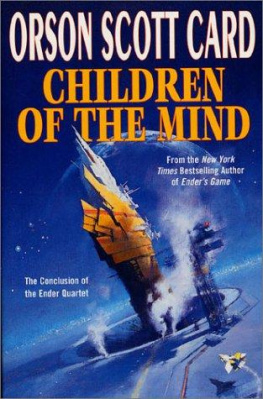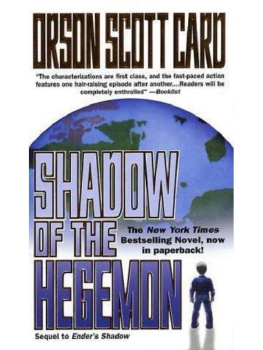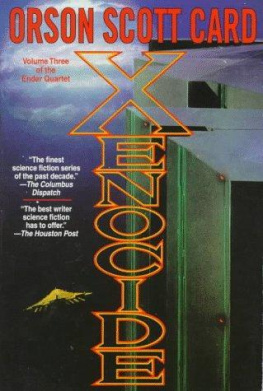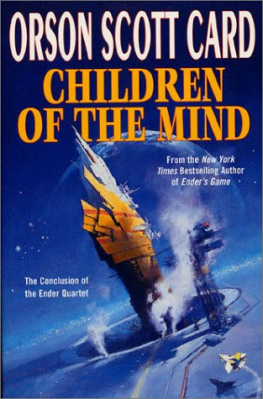Orson Scott Card - Ender Wiggin 3 Xenocide
Here you can read online Orson Scott Card - Ender Wiggin 3 Xenocide full text of the book (entire story) in english for free. Download pdf and epub, get meaning, cover and reviews about this ebook. year: 1992, publisher: Tom Doherty Associates, genre: Humor. Description of the work, (preface) as well as reviews are available. Best literature library LitArk.com created for fans of good reading and offers a wide selection of genres:
Romance novel
Science fiction
Adventure
Detective
Science
History
Home and family
Prose
Art
Politics
Computer
Non-fiction
Religion
Business
Children
Humor
Choose a favorite category and find really read worthwhile books. Enjoy immersion in the world of imagination, feel the emotions of the characters or learn something new for yourself, make an fascinating discovery.
- Book:Ender Wiggin 3 Xenocide
- Author:
- Publisher:Tom Doherty Associates
- Genre:
- Year:1992
- Rating:3 / 5
- Favourites:Add to favourites
- Your mark:
- 60
- 1
- 2
- 3
- 4
- 5
Ender Wiggin 3 Xenocide: summary, description and annotation
We offer to read an annotation, description, summary or preface (depends on what the author of the book "Ender Wiggin 3 Xenocide" wrote himself). If you haven't found the necessary information about the book — write in the comments, we will try to find it.
Ender Wiggin 3 Xenocide — read online for free the complete book (whole text) full work
Below is the text of the book, divided by pages. System saving the place of the last page read, allows you to conveniently read the book "Ender Wiggin 3 Xenocide" online for free, without having to search again every time where you left off. Put a bookmark, and you can go to the page where you finished reading at any time.
Font size:
Interval:
Bookmark:
Xenocide
Ender Wiggin Saga, Volume 3
by Orson Scott Card
ISBN 0765362430, 9780765362438
A Tor book
PublisherMacmillan, 1992
ISBN0812509250, 9780812509250
Editionreprint, revised
To Clark and Kathy Kidd:
for the freedom,
for the haven,
and for frolics all over
America.
Pronunciation
A few names may seem strange to English-speaking readers. From Chinese, Quing-jao is pronounced tching jow; Jiang-quing is jee-eng tching. From Portugese, Quim is pronounced keeng; Novinha is no-VEEN-ya; Olhado is ol-YAH-do. From Swedish, Jakt is yahkt.
Other names are either easier to pronounce as written, or repeated rarely enough that they shouldnt cause difficulty.
Acknowledgments
A chance meeting with James Cryer in the Second Foundation Bookstore in Chapel Hill, North Carolina, led directly to the story of Han Qing-jao and Han Fei-tzu at the heart of this book. Learning that he was a translator of Chinese poetry, I asked him on the spot if he could give me a few plausible names for some Chinese characters I was developing. My knowledge of Chinese culture was rudimentary at best, and my idea for these characters was for them to play a fairly minor, though meaningful, role in the story of Xenocide. But as James Cryer, one of the most vigorous, fascinating and generous people I have known, told me more and more about Li Ch'ing-Chao and Han Fei-tzu - as he showed me their writings and told me more stories about other figures in Chinese history and literature - I began to realize that here was the real foundation of the tale I wanted this book to tell. I owe him much, and regret that I have passed up my best opportunities to repay.
I also give my thanks to many others: To Judith Rapport, for her book The Boy Who Couldn't Stop Washing, which was the source of the information about obsessive-compulsive disorder in this novel.
To my agent Barbara Bova, who called this book into existence by selling it in England before I had ever thought of writing it. To my American publisher Tom Doherty, for extraordinary faith and generosity that I hope will all be justified in the end. To Jim Frenkel, the editor who wisely turned down the first outline of this book when I offered it to Dell back in 1978, telling me - correctly - that I wasn't ready yet to write such an ambitious novel. To my British publisher, Anthony Cheetham, who has believed in my work from the start of my career, and has patiently waited for this book far longer than either of us bargained for. To my editor Beth Meacham, for being a friend, adviser, and protector through the preparation of this and many other books. To the many readers who have written to me urging me to return to Ender's story; their encouragement helped a great deal as I struggled through the most difficult writing project of my career so far. To Fred Chappell's graduate writing workshop at the University of North Carolina at Greensboro, for looking over and responding to the first draft of the Qing-jao storyline. To Stan Schmidt at Analog, for being willing to publish such an extraordinarily long portion of the novel as the story "Gloriously Bright." To my assistants, Laraine Moon, Erin Absher, and Willard and Peggy Card, who, serving well in such completely different ways, gave me the freedom and help that I needed in order to write at all. To friends like Jeff Alton and Philip Absher, for reading early drafts to help me ensure that this hodge-podge of characters and storylines actually did make sense. And to my children, Geoffrey, Emily, and Charlie, for being patient with me through the crabbiness and neglect that always seem to accompany my bursts of writing, and for letting me borrow from their lives and experiences as I create the characters I love the most.
Above all, I give my thanks to my wife, Kristine, who has suffered through every arduous step in the creation of this book, raising questions, catching errors and contradictions, and - most important - responding so favorably to those aspects of the story that worked well that I found in her the confidence to go on. I have no idea who I would be, as a writer or as a person, without her; I intend never to have occasion to find out.
Contents
Chapter 1
A Parting
Han Fei-tzu sat in lotus position on the bare wooden floor beside his wife's sickbed. Until a moment ago he might have been sleeping; he wasn't sure. But now he was aware of the slight change in her breathing, a change as subtle as the wind from a butterfly's passing.
Jiang-qing, for her part, must also have detected some change in him, for she had not spoken before and now she did speak. Her voice was very soft. But Han Fei-tzu could hear her clearly, for the house was silent. He had asked his friends and servants for stillness during the dusk of Jiang-qing's life. Time enough for careless noise during the long night that was to come, when there would be no hushed words from her lips.
"Still not dead," she said. She had greeted him with these words each time she woke during the past few days. At first the words had seemed whimsical or ironic to him, but now he knew that she spoke with disappointment. She longed for death now, not because she hadn't loved life, but because death was now unavoidable, and what cannot be shunned must be embraced. That was the Path. Jiang-qing had never taken a step away from the Path in her life.
"Then the gods are kind to me," said Han Fei-tzu.
"To you," she breathed. "What do we contemplate?"
It was her way of asking him to share his private thoughts with her. When others asked his private thoughts, he felt spied upon. But Jiang-qing asked only so that she could also think the same thought; it was part of their having become a single soul.
"We are contemplating the nature of desire," said Han Fei-tzu.
"Whose desire?" she asked. "And for what?"
My desire for your bones to heal and become strong, so that they don't snap at the slightest pressure. So that you could stand again, or even raise an arm without your own muscles tearing away chunks of bone or causing the bone to break under the tension. So that I wouldn't have to watch you wither away until now you weigh only eighteen kilograms. I never knew how perfectly happy we were until I learned that we could not stay together.
" My desire," he answered. "For you."
"'You only covet what you do not have.' Who said that?"
"You did," said Han Fei-tzu. "Some say, 'what you cannot have.' Others say, 'what you should not have.' I say, 'You can truly covet only what you will always hunger for.'"
"You have me forever."
"I will lose you tonight. Or tomorrow. Or next week."
"Let us contemplate the nature of desire," said Jiang-qing. As before, she was using philosophy to pull him out of his brooding melancholy.
He resisted her, but only playfully. "You are a harsh ruler," said Han Fei-tzu. "Like your ancestor-of-the-heart, you make no allowance for other people's frailty." Jiang-qing was named for a revolutionary leader of the ancient past, who had tried to lead the people onto a new Path but was overthrown by weak-hearted cowards. It was not right, thought Han Fei-tzu, for his wife to die before him: her ancestor-of-the-heart had outlived her husband. Besides, wives should live longer than husbands. Women were more complete inside themselves. They were also better at living in their children. They were never as solitary as a man alone.
Jiang-qing refused to let him return to brooding. "When a man's wife is dead, what does he long for?"
Rebelliously, Han Fei-tzu gave her the most false answer to her question. "To lie with her," he said.
Font size:
Interval:
Bookmark:
Similar books «Ender Wiggin 3 Xenocide»
Look at similar books to Ender Wiggin 3 Xenocide. We have selected literature similar in name and meaning in the hope of providing readers with more options to find new, interesting, not yet read works.
Discussion, reviews of the book Ender Wiggin 3 Xenocide and just readers' own opinions. Leave your comments, write what you think about the work, its meaning or the main characters. Specify what exactly you liked and what you didn't like, and why you think so.

